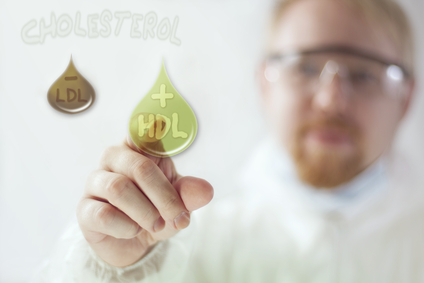
Cholesterol has gotten a bad rap in recent history. From pharmaceutical advertisements to food labeling, we are told to lower our cholesterol—and to do it now! While it’s true that lowering your LDL (low-density lipoprotein) cholesterol levels is the healthy thing to do, there is one type of cholesterol that you don’t want to lower. In fact, you actually want this cholesterol level to go as high as possible.
We’re talking about HDL (high-density lipoprotein) cholesterol. Raising your HDL levels can help keep your blood vessels healthy and reduce your risk of heart disease.
A Little Background on HDL Cholesterol
Cholesterol is a waxy, fatty-feeling substance that is found throughout the body. LDL carries cholesterol through the bloodstream to your tissues and cells. This is an essential function for the body, but when there is too much cholesterol, it builds up on the walls of the arteries and that can lead to heart disease or other serious cardiovascular complications.
On the other hand, HDL removes LDL from the arteries and carries it back to the liver. At that point, it’s filtered out and excreted from the body. Since HDL works to clean out the blood vessels, it is referred to as “good” cholesterol. Having healthy levels of HDL can protect your body against cardiovascular diseases.
For every 1 mg/dL increase in HDL, your risk of having a cardiac event decreases by 2-3%.
Having low levels of HDL, even if your total cholesterol levels are healthy, can put you at risk for coronary heart disease and heart attack. Men who have levels below 40 mg/dL or women that have levels below 50 mg/dL are at risk. Both sexes should aim to have HDL levels of 60 mg/dL or above.
How to Increase Your HDL Levels
If you’re looking to raise your HDL levels, you have quite a few options to try. There are some cholesterol medications that can raise HDL, but here are five ways you can increase your HDL without making a trip to the doctor.
1. Adjust Your Diet
The two most important dietary factors for raising HDL levels are fats and fiber. Trans fatty acids reduce HDL levels, so you’ll want to avoid foods with trans fat. But you can go ahead and indulge (a little!) in monounsaturated fats. These fats raise HDL levels. Try to get more canola oil, olive oil, avocado, or peanut butter. As for fiber, try to add more soluble fiber into your diet. Experts recommend oatmeal, fruits and vegetables, and legumes.
2. Pour Yourself A Drink
Alcohol, in moderation, can raise HDL levels by as much as 4 mg/dL. Don’t go crazy with this one – experts recommend that women have one drink and men have two drinks, at most, per day. If you have liver disease, alcoholism, or a strong family history of alcohol abuse, you might reconsider this suggestion.
3. Quit Smoking
If you use tobacco products, giving up the habit could really help your blood vessels. Research shows that quitting smoking can raise HDL by up to 10 percent.
4. Stay Active
Engaging in regular exercise can benefit your health in a number of ways, including raising your HDL levels. After two months of regular aerobic activity, you could increase your levels by up to 5 percent. Any activity that gets your heart pumping hard for 30 minutes per day will work.
5. Drop the Extra Pounds
Carrying around extra weight really taxes the cardiovascular system. To increase your HDL by 1 mg/dL, you will need to lose about six pounds.
Now that you know the facts about HDL cholesterol, challenge yourself to raise your levels. Simply start by asking your doctor to order a cholesterol blood test. Along with some other cholesterol information, this test will show you your current HDL levels. Then you can get to work—eat healthy, stay active, and don’t smoke! When you have your blood retested (experts recommend having a cholesterol test every five years), you’ll be able to see some heart-healthy results!
Enjoyed this article? Try reading these as well . . .
3 Unexpected Foods to Help You Lower Cholesterol
Why Diabetics are at Risk for High Cholesterol
High Cholesterol: Reducing Your Risk of Stroke

Speak Your Mind
You must be logged in to post a comment.